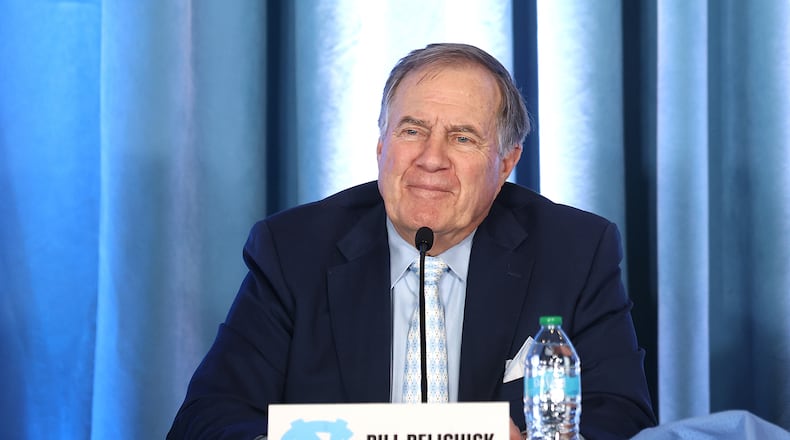It’s almost as if the mucky mucks at North Carolina got together and said, “Hey, let’s try something that has a track record of not working, only this time with someone who’s past retirement age.”
If it was attention and buzz that North Carolina sought in hiring coaching legend Bill Belichick, the Tar Heels are bathing in it. But this seems fated to not work out as they intend.
Herm Edwards, Lovie Smith, Jim Mora and Charlie Weis are but a few predecessors who tried and failed at college coaching (Mora continues to toil at UConn with mixed results) after spending all or most of their coaching careers at the NFL level. In this case, Belichick becomes the Tar Heels coach at the age of 72 without having spent a day of his life as a college coach.
The rationale is so tempting, and Belichick confidently sold it to ESPN’s Pat McAfee even before he took the job. He would run an NFL-style program, only at the college level. The nutrition, training, scheme and coaching, among other facets, would mimic an NFL team’s in order to prepare players for the NFL. It was unnecessary to state the obvious. He also would bring all of the coaching wisdom and tactical genius that produced six Super Bowl championships with the New England Patriots.
It’s a version of what every NFL or NBA coach says when he comes to his new college campus. It has worked, but rarely, and has made more sense than this when it has. For instance, Jim Harbaugh left the NFL to lead Michigan to a national championship, but he had previously been a successful coach at Stanford. Pete Carroll won two national championships at USC after a long NFL run, but in hindsight his youthful energy was a match for the college game. And neither was 72.
You can argue that it’s different because Belichick is a much better coach than anyone who has tried this before, and maybe that’s the answer. But the response to that is, if this is such a no-brainer hire, why doesn’t this template work, even to a lesser degree, with other NFL coaches?
What seems to go missing is that this isn’t a major leaguer coming down to Triple-A and dominating. It’s more like a college professor who takes a job teaching high school. Coaching in the NFL and at the college level have some similarities but ultimately require different skill sets.
Clemson coach Dabo Swinney has turned out more NFL draft picks and first-rounders than any other active coach since the first draft of his tenure in 2009 and has won two national championships. Does that make him NFL coaching material?
Georgia coach Kirby Smart does exactly what North Carolina is counting on Belichick to do in Chapel Hill, but it’s not because Smart spent a year as an assistant coach with the Miami Dolphins. It’s because he knows how to identify and recruit high-school prospects, hire excellent college coaches, connect with and motivate college athletes, encourage support from the fan base and follow a training plan for winning at the college level. They’re skills and knowledge that he has acquired over years of coaching in college.
Belichick may be able to do all of those things, but he has no experience doing any of them at the college level.
And another thing — the NFL-style program and pipeline that he plans to establish — what exactly does North Carolina think its competitors are doing? Smart isn’t looking toward Chapel Hill, hitting his head and saying, “Darn. What a great idea. I wish we would have thought that.”
Undoubtedly, name, image and likeness payments have drastically changed how college football players view their college choices and careers. They’ve made coach-player relationships more transactional than they were before. That surely will help Belichick, as the potential benefit of being coached by the greatest NFL coach of all-time will be real (so long as UNC’s NIL money is competitive). It’s not hard to imagine a college player who has proved himself in his first or second season transferring to UNC to prepare for the draft under Belichick’s supervision.
But that goes back to wondering what he’ll really have to offer as a coach. Assembling talent is one thing (And that’s if he can do that. His draft record with the Patriots was suspect.) Motivating and developing that talent and molding it into a team is something else, and something, again, he’s never done with college athletes.
Florida State coach Mike Norvell had all the talent he could want this season, but got the wrong quarterback out of the portal and couldn’t develop a group of transfers into a cohesive team. The season isn’t over for Ohio State, but the best team money could buy still couldn’t win the Big Ten, let alone beat Michigan.
The demands of coaching in college have changed, but the ability to build and lead a team still matters and is maybe even more important now than it used to be considering how players’ priorities have changed.
An interesting aspect about the flag-planting kerfuffles is that it was a little surprising that an intangible like school pride still evidently means something in the NIL age. Does Belichick know the right buttons to push while sounding (and being) authentic? If he amasses a roster of draft-worthy talent and still can’t beat N.C. State, “We’re onto the Pinstripe Bowl” most assuredly is not going to fly.
Belichick’s mantra with the Patriots was “Do your job.”
Dressed in Carolina blue, it’ll be most interesting to see if he can do his.
About the Author
Keep Reading
The Latest
Featured




